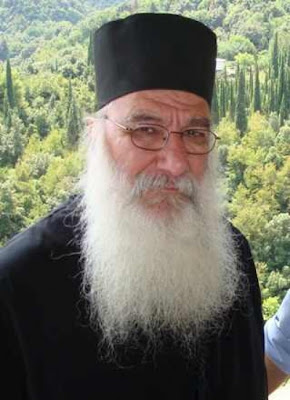
Monk Moses, the well known intellectual, has given an interview to the 24-hour ecclesiastical news agency “Romfea.gr”. We have visited his cell at Saint Panteleimon Skete of the Holy Mount Athos.
Elder Moses, speaking to the Director of “Romfea.gr”, Mr. Emilios Poligenis, gives substantial answers on issues which refer to the Holy Mountain, the professor Christos Yiannaras, the Vatopaidi case and the Abbot Ephraim, the financial crisis and the Patriarch’s Liturgy at Panagia of Soumela Monastery. The interview went on as follows:
EP: Father Moses, it is a great pleasure to be with you today here at God’s guarded garden of our Panagia. You have been a monk for more than 35 years; please tell us about the Holy Mount Athos of yesterday and today.
MM: Dear Mr. Poligenis, I am also pleased to have your acquaintance as a visitor of our humble Cell of Saint John Chrysostomos at Saint Panteleimon Skete, as well as for your honest love for the Church and for the impartiality of the news agency “Romfea.gr”, which you have been successfully directing for the last three years. The Holy Mount Athos is truly guarded by God, sheltered by the Mother of God; it is an incubator of saints and a fragrant garden of our Lady as well as being walked by saints. This month we have been fervently chanting Paraklisis daily in Her name and we are passionately expecting the much honored feast of her dormition and her ascension to heaven.
Our Panagia is the most beloved female person by all monks at the Holy Mountain. We have sixty miracle performing icons, the Katholica, the Kyriaka, the chapels, Protaton, her Holy Belt of the Virgin Mary. All of these speak of Her in a place inaccessible to women.
It has been 36 years since I have passed through the gate of the Holy Monastery of Simonopetra and 25 years since I have resided at the cell of Saint John Chrysostomos. I truly believe than only 36 days have passed since then! I do not really think that the Holy Mount Athos has changed at all during this time. The monastic order has been continuing for more than a thousand years. This is very crucial to the lives of monks, who devote several hours a day to the Divine Liturgy. Prayer is their main job and this seasons their lives with fragrance.
The fact that some roads have been built and that some cars appear, this is of a minor importance. But on the other hand, one must be very careful to show respect for the place and the environment. Some old passageways have been destroyed and this was wrong.
Technical advancements need to be used properly and with discretion. I do not think that to replace the oil lamp with an electric one will do away with tradition. Some people come to the Holy Mountain only once in their life having a romantic idea about it and they think that it is a petrified museum without life, movement and continuation. They become harsh critics and they only have criticism and hand out instructions. However, if they are to move about, they demand a descent vehicle, they are bothered by dust and they want a comfortable stay as if they are staying at a hotel. I believe that if the Holy Mountain has been altered it is only externally and not internally. Important restoration works have taken place in the last few years which have been most necessary in order to continue the thousand year legacy of monastic life, based on ancient, sacred rules which conserve the monastic constitution, the life of devotion and quietude.
EP: Can one find inside the Holy Mountain people of the spiritual stature of elders Paisios, Porphyrios, Joseph and others?
MM: I received a phone call one evening from a certain woman. “Father Moses” she said, “now that Elder Paisios passed away who took his place?” I said: “It is your spiritual father”. “Do you know him?” “No” “Then why do you say this?” “Listen my lady, sainthood is not transferable but achievable. Unless the person struggles with patience, sainthood cannot be conveyed.” “Thank you”.
She probably didn’t like my reply. People today are forever looking for quick and easy solutions. The ‘fast food’ of secular life has been passed on to the spiritual life. Even the devout are not willing to delay and exhaust themselves at all. They want immediate solutions to their problems. That’s why they are looking for virtuous elders to solve their problems immediately. They do not want to persevere in prayer, to humble themselves, to show patience.
If they cannot find such elders, they create them. The worst thing is to believe that you are a saint. The biggest problem today is phony sainthood. May the Lord save us from such phony saints. At the Holy Mountain there is a saying: “It is easy to delude yourself. The difficult thing is to be rescued from delusion”.
Blessed and virtuous Elder Paisios was saying: “He who believes that he is well, is the worst of all since he will never go to the doctor”. The search of virtuous elders may today take unreasonable scale and the elder is seen as a guru, or a magician or a medium. Both sides must be especially careful. Some people are loading on the elders their personal opinions, beliefs or fantasies on doomsday prophecies, on demons, on antichrist, on wars, and on the wishful return of castles in Anatolia. We have been blessed many times to kiss the hand of the blessed elders Porphyrios the Kafsokalivitis (+1991), of Paisios the Agioritis (+1994), of some spiritual children of Elder Joseph the Spileotis (+1959) and many others.
There are certainly today in the Holy Mountain and elsewhere devout elders like the above, whom their worshippers call ‘saints’. As long as the Church exists, the Divine Liturgy will take place and saints will be born. The Holy Spirit does not delay, does not sleep and does not stop inspiring. However, sainthood loves anonymity, secrecy and the lack of honors. Sainthood does not possess an illuminating label, roadmaps, road callers, strong search lights and advertising. He, who announces that he is a saint, stops being one. We are in the process of publishing a large Gerontikon of the Holy Mountain with five hundred virtuous personalities of the 20th century.
The Holy Mountain was called ‘Holy’ because of the holiness of its monks. The Athonite oil candle of sainthood has never been blown out. It is kept lit up to this day, consoling many people.
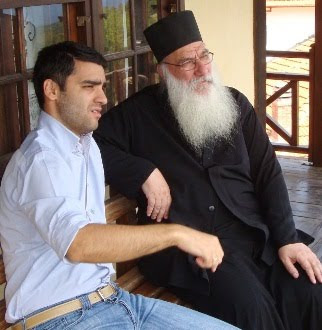
EP: Last month, the Prime Minister Mr. Papandreou, has set up a committee of politicians to protect the Holy Mountain. What is your opinion on this?
MM: As we have said, the Holy Mountain is being protected by our Panagia. But it also needs the protection of the State. However, I do not know what reason they are giving for the existence of this committee, its purpose and aims. The problems that the Holy Mountain is facing are best known to the monks. Various governments have assisted in various ways occasionally. But I am afraid that they have not so far understood the history, the value, the importance and the contribution of the Holy Mountain. During the last crisis not a single politician raised his voice to say: “Gentlemen, Greece has the Acropolis and the Holy Mountain. Please respect their sanctity. Do not de-sanctify everything. Do not use the Holy Mountain for political gains”. I wish that the committee will not act unilaterally but that it will cooperate with the Holy Community of the Holy Mountain for the Mountain’s benefit. Everyone’s wish is that it is successful and that it substantially helps to meet the needs of the Holy Mountain.
However, at the same time the Prime Minister set up this committee, the government rejected the Holy Community’s request to benefit from the program “Society of Information”, which dealt with the electronic storage of the Byzantine relics of the Holy Mountain. Isn’t this a tragic irony?
EP: Yes, it a tragic and great irony without doubt. We wish that this decision is rescinded soon. Geronda, is there any cooperation between the monasteries? If there is, is it substantial or only for the record?
MM: I believe that there is cooperation, especially with regards to the decision taken during the meetings of the Holy Community. The decisions are of course taken by the majority. We are talking about the oldest democracy in the world, which is constantly at work for more than the last ten centuries.
EP: Perhaps this cooperation will become even more substantial for the common good.
MM: The amicable cohabitation for more than a thousand years of people from many places has a lot to say in a divided and combating world.
EP: Last April you have written a caustic letter against the views expressed by professor Yiannaras, which seemed very popular. What was the reason for writing it?
MM: The reason was obvious. Mr. Yiannaras is a well known professor who has written many papers. However, I believe he should be more careful on the things he writes about. Of course he has the right to express his own opinion and judgment, but it does him no good to insult the numerous brotherhoods of the Holy Mountain, using expressions fit for the alleyways. I believe and wish that he repented for what he has written hastily and carelessly.
EP: Is there a “scandal” in the Vatopaidi case, Father Moses? Already the minister of Defense, Mr. Venizelos, and the leader of the opposition, Mr. Samaras, have said that there is no Vatopaidi “scandal”.
MM: For two whole years the mass media have been trying daily to convince people about the existence of the great Vatopaidi ‘scandal’. Of course many people have been swayed. There was a nasty climate. Some people have risen in the ranks, some won votes, promotions, etc. The investigation has so far not found dirty money, illegal actions or embezzlement. It is difficult for anyone during this furor to express a different opinion since he will be accused that he has been bribed.
For two whole years, a Holy Mountain monastery with over a hundred and ten monks, with long history and contribution to society, has been stoned, insulted, ridiculed, assaulted and very few people managed to defend it, even though no illegality has ever been proven. For me a scandal constitutes the non-unity of the Holy Mountain. No one ever said that one must support an illegal act, or that one should not testify to the appropriate authorities. But it is totally another thing for some monks to publically condemn their brothers.
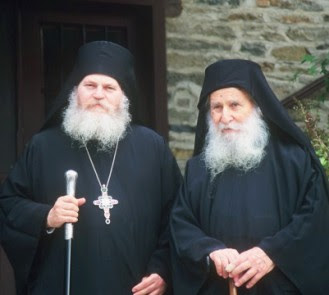
EP: What is your opinion of Abbot Ephraim?
MM: Abbot Ephraim has become the most slandered person in the last few decades. No one has ever been attacked so much. This was done as if he was a war criminal or a drug dealer, or a trafficker of persons. His faith, his lack of anger, his patience and his forgiveness are virtues which reveal an internal strength which should tell a lot to his persecutors. I am not familiar with a lot of details of the case but the stance of the Abbot makes me have a positive view on him. On the contrary, the attitude adopted by his persecutors, even that of priests, makes me sad. I do not wish to make people tired by saying many things. I wish and pray that the whole truth will prevail and that there will be no room for empathy or prejudice. If mistakes have been made, then they should be corrected. But it is another thing to condemn someone before the verdict. Justice will no doubt carry out its difficult task in an impartial and free manner.
EP: During the last few months, Greece is going through some difficult times because of the financial crisis, so much so that people sometimes lack even necessities. Where are we heading? Is there a hope?
MM: It is true that there is a serious financial crisis going on and that some of our brothers are having a difficult time. But it is worth noting that the recent Greek way of life exhibits serious cracks. The only vision of the modern Greek was how to make money, to gorge oneself, to spend, to abuse and to have a good time. He worships money, hedonism, self love and ambition. Both old and young, worship at the altars of money, of the body and of ambition. Their only aim is how to please themselves, to live well and to look after oneself exclusively. Comfort brought boredom. The West is warning us that we have gotten worn out of being rested. The only things which are worth something for the modern Greek is money, buildings, land and cars. Materialism has won. Frugality was seen as misery, simplicity as silliness, poverty as a curse, self control as foolishness. Deception is regarded as intelligence, lies as wisdom, adultery as vigor, honesty as frivolity. This crisis is our judge. The crisis is not just financial but mostly spiritual. In any case, we must never lose heart, lose our hope, become lazy and or sit around lamenting our misfortunes. Let us do what we can and quite possibly something sweet will come out from the hardship. We may at some point feel that we have not come to this earth to buy a new luxury car, nor is it worth living for something like this and neither did God bring us on this earth for this purpose only.
EP: Finally Father Moses, I would like you to comment on the historic Divine Liturgy held at Panagia (Mother of God) of Soumela Monastery.
MM: The Holy Liturgy officiated by the Patriarch at the incredible Monastery of Panagia Soumela, after 88 years of desolation, was a moving and a greatly significant historic event. It did not just bring joy to the People of Pontus but also to the Greeks everywhere. This monastery with its more than a thousand year spiritual, cultural and educational contribution, regained some of its old splendor. It constitutes the pride of the Pontus area. The Ecumenical Patriarch, Mr. Bartholomew, was justifiably deeply moved and spoke directly to the hearts of the worshippers. I am certain this liturgy will become an important milestone of his calling. The presence of the Metropolitan of Drama, Mr. Paul, whose origins were from Pontus, as well as his words and his poems brought tears to the eyes of numerous people. The Panagia of Soumela, the Athonite Panagia, the Greek Panagia, Panagia of the whole of the universe, may she always mediate for us. We all need her mediation. The humble, pure, silent, modest Ever-Virgin, may she inspire everyone and shelter her beloved Athonite garden without fail. I thank you Mr. Poligenis for the chance you have given me and please forgive the pain which my honesty may have caused and the austerity I may have shown because I have not been able to be two-faced in order to balance the imbalance of that which is diversified. May our Panagia strengthen you in your task of impartial reporting.
EP: Geronda (Elder), I thank you for the interview. I would also like to thank Fr. Chrysostomos for his Abraham-like hospitality.
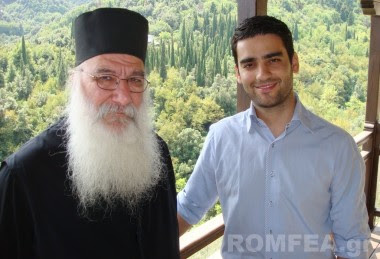
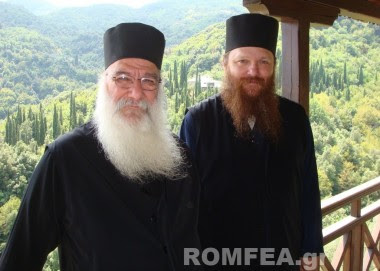
Source: Romfea.gr
Translated by: Olga Konnari-Kokkinou
Edited by: John Sanidopoulos